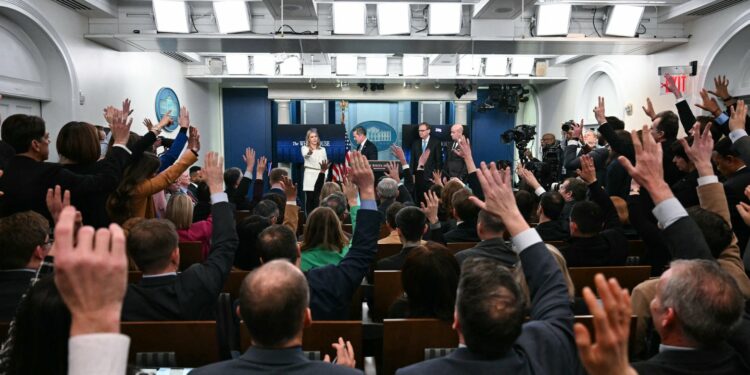Sign up for the Slatest to get the most insightful analysis, criticism, and advice out there, delivered to your inbox daily.
Donald Trump’s political machine has come to power not once but twice as a reactionary regime promising to counter the progressive reforms of previous decades. That’s the heart of making America great again—an implication that we were once better off than we are now. This is a right-wing movement that has lambasted the use of specified personal pronouns and workforce diversity efforts as either laughable follies or furious intrusions into the fabric of American society. It’s a movement that has complained at length about the woes of a so-called cancel culture, in which people face professional consequences for slurs, hate speech, and even abject violence.
This is a movement that has gotten hold of internet platforms too: Elon Musk took over Twitter and renamed it X in order to restore “free speech,” a move that amounted to allowing more racism, antisemitism, spam, and vitriol to flow on the website. Meta’s Mark Zuckerberg has fallen in line too, ending the company’s diversity programs and rolling back content moderation efforts put in place to make Facebook and Instagram decent places to speak online.
But real censorship isn’t what happens on Facebook or X. These are private companies with First Amendment rights to say what they want and, yes, moderate content how they like. One can be uncomfortable with the immense role they play in our daily lives and the control they have over popular speech, but that doesn’t make it real censorship.
No, real censorship is what happens when governments exercise their awesome power to stop the free flow of speech and of the press. It’s what happens when the government demands that news outlets write one way and use one term and threatens them with unequal access as a result—a decision that will make our country’s poor information ecosystem even poorer. It’s what happens when specific reporters are kicked out of public spaces, rewarded for playing nice, or even pressured to turn over sources. It’s what happens when the president-elect sues an Iowa pollster over the results of her survey, or when the acting U.S. attorney for the District of Columbia threatens to prosecute anyone who criticizes Musk and his team at the Department of Government Efficiency. That’s real censorship.
It’s what happens when the White House commands that reporters call the Gulf of Mexico by a new name—the Gulf of America—or face consequences.
After the White House issued an executive order renaming the Gulf of Mexico the “Gulf of America,” a Trump effort to “honor American greatness,” the Associated Press issued a statement that it would not go along with the change but would acknowledge Trump’s decision.
“The Gulf of Mexico has carried that name for more than 400 years,” wrote AP standards chief Amanda Barrett on the company’s website. “The Associated Press will refer to it by its original name while acknowledging the new name Trump has chosen. As a global news agency that disseminates news around the world, the AP must ensure that place names and geography are easily recognizable to all audiences.” The AP conceded one win to Trump: It went along with the ordered name change from Denali to Mount McKinley, since the matter affects only the United States, not other countries that look to the AP as a source of reliable information.
The AP’s significance stretches far beyond its own publication. Not only do newspapers, magazines, and websites across the country source stories from the news agency’s wire service—which these publications pay for in order to reprint important news—but the AP publishes the most influential style guide in the industry, the Associated Press Stylebook. As such, it’s a tone setter and standard-bearer for the entire industry. As the AP goes, so goes the nation.
So the AP’s decision to go against Trump was not met kindly by White House officials. The outlet was banned from all briefings and refused access to the press pool aboard Air Force One. On Friday, the Associated Press sued three White House officials in federal district court in Washington. The suit alleges that the officials violated the AP’s constitutional protections under the First Amendment, which guarantees a free press, and the Fifth Amendment, which affords due process under the law.

Jill Filipovic
What Trump Really Wants Is Clearer Than Ever
Read More
In its complaint, the AP disclosed that White House chief of staff Susie Wiles, a named defendant, said that the White House admitted to targeting the AP because the stylebook is “used by many as a standard for writing and editing” and by “journalists, scholars and classrooms around our country.” She also implied that if the AP complies, it’ll be allowed back into the good graces of the White House. (After all, the administration appears to have a penchant for quid pro quo arrangements, if that weren’t already evident by the controversial decision to drop the prosecution of New York Mayor Eric Adams in exchange for his assistance with immigration enforcement.)
First Amendment law precedent generally bars viewpoint discrimination by the government; in this context, the government might be able to deny access to the press based on security concerns, but it couldn’t single out one news outlet as unworthy of access because of its viewpoint—in this case, how the gulf should be named.
Well, We Have Barron Trump’s First College Scandal
It’s Ridiculous That This Performance Is Supposed to Win an Oscar
Detective Shows Are Great, but One Subgenre Is the Very Best
Trump Issued Perhaps His Most Terrifying Executive Order on Tuesday
This isn’t entirely new territory. Trump’s first administration lost similar lawsuits against CNN White House correspondent Jim Acosta and Playboy reporter Brian Karem after stripping them of their White House press credentials. But in this case, there wasn’t even a rabble-rousing reporter—rather, a news organization with immense power that refused to play along with the government’s language-policing demands.
But the Associated Press has decades of legal precedent on its side, so it won’t be shocking to see the district court swiftly deliver justice. There is a larger contradiction at the core of the Trump administration’s punitive efforts: the utter hypocrisy.
For Trump, Musk, and the team of billionaires—elected and unelected—running the government, the hypocrisy is the point. The real language police are inside the White House, and they’re running with a nouveau take on “alternative facts” all these years later. If the AP isn’t able to push back successfully when it’s extorted for narrative control, then we’re already entering something else altogether: a truly Orwellian time in American politics. When free speech is only what the government says it is, then we don’t really have free speech.

Sign up for Slate’s evening newsletter.
Source link : http://www.bing.com/news/apiclick.aspx?ref=FexRss&aid=&tid=67bccc2252f84f22b84c4935834ecd85&url=https%3A%2F%2Fslate.com%2Fbusiness%2F2025%2F02%2Fdonald-trump-gulf-america-mexico-associated-press-first-amendment-lawsuit-free-speech.html&c=7968604847857849314&mkt=en-us
Author :
Publish date : 2025-02-24 06:34:00
Copyright for syndicated content belongs to the linked Source.












